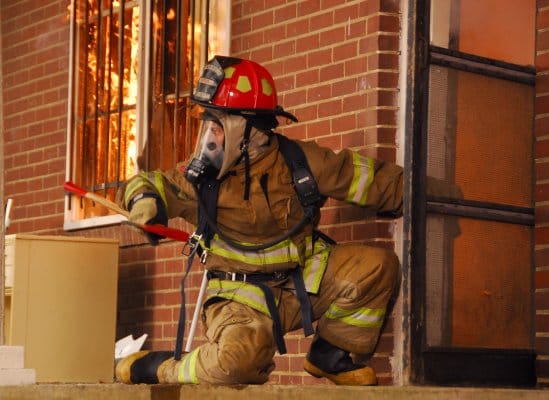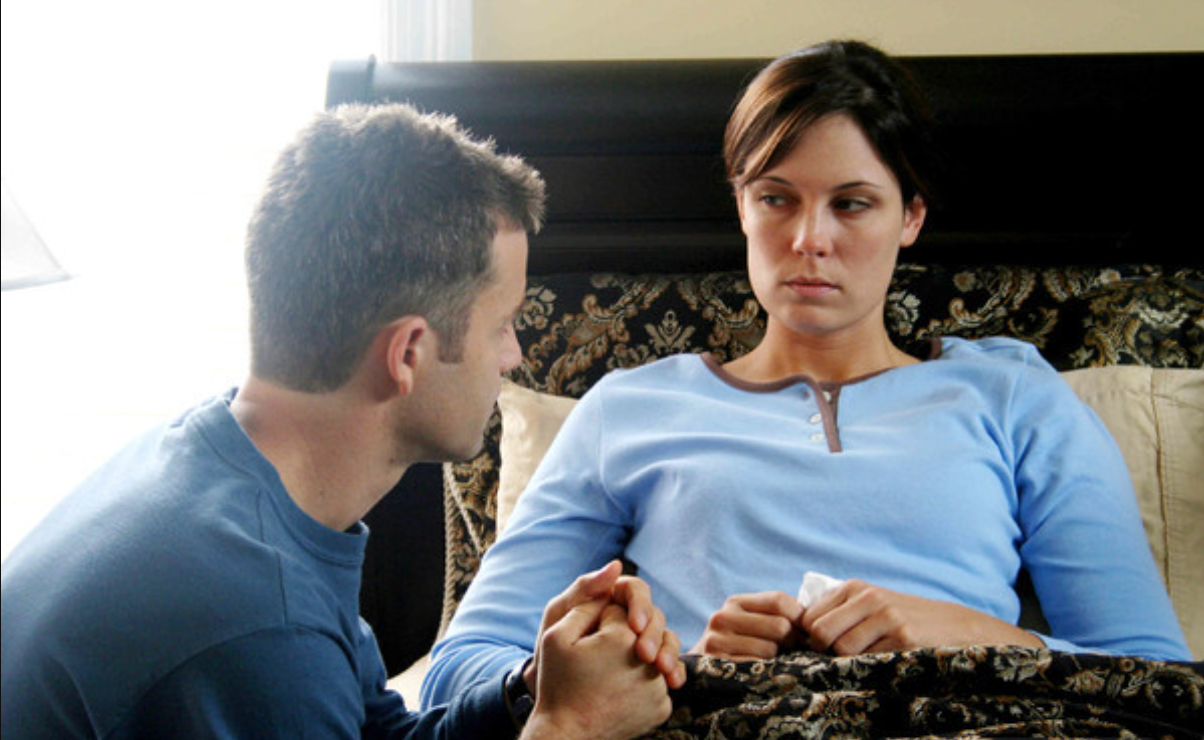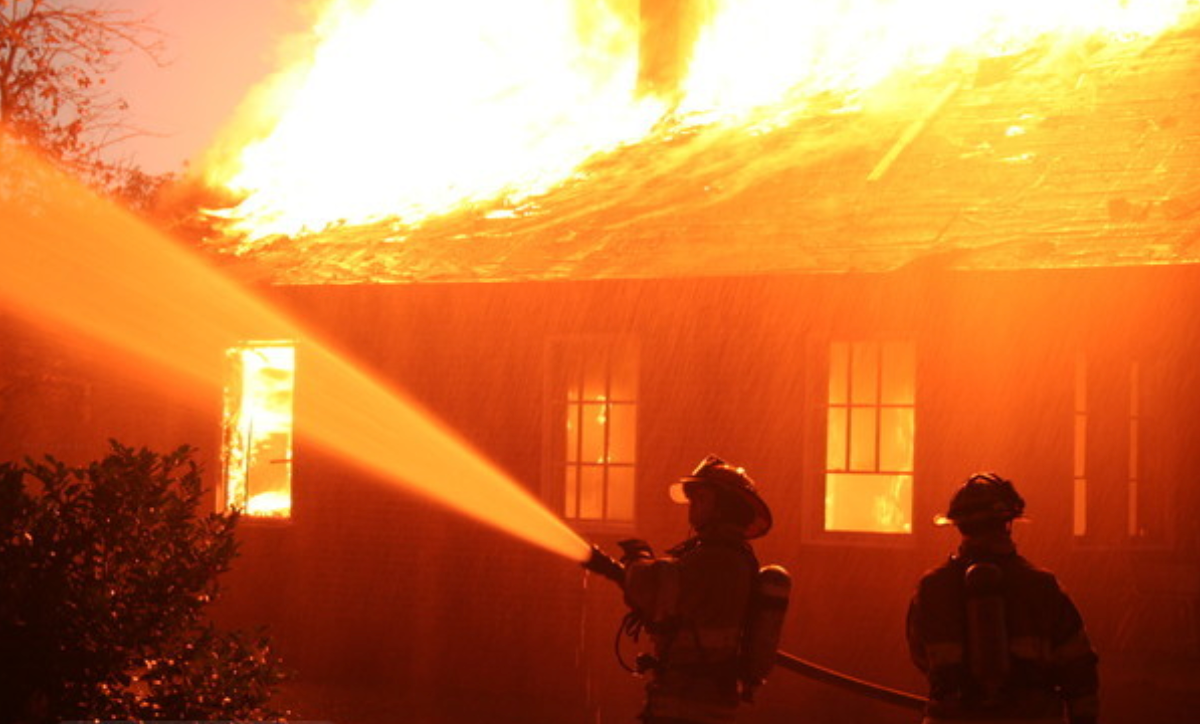The art of letting things burn
Notes on fireproofing, certainty, and that one mediocre Evangelical film I still think about.
The movie Fireproof dropped in 2008. That’s the 2008, the year we turned on the Large Hadron Collider and hurled particles at each other in search of connecting glue of the universe, the year the California Supreme Court decided to let same-sex couples marry; the year Barack Obama campaigned with a Shepard Fairey poster, and everything felt iconic and weird, and the kids lit HOPE up in big letters—it was the year, remember, when he actually won. It was also the year that Britney melted down and Heath Ledger died in his apartment and Abraham K. Biggs died on live webstream, the year that Lehman Brothers and Washington Mutual collapsed and the markets reeled, blistered, and then went under. It was the year that all the houses built on cheap credit were scraped out of people and sat like rotted-out teeth on the crests of the suburbs. It was that year. I graduated from college that year with a cohort of people who were scared to death, and with reason.
In the midst of the melée: Alex and Stephen Kendrick, brothers from Georgia, showed up in Hollywood with Fireproof, a very Christian movie they’d made on a shoestring budget—just half a million, according to LA Weekly. Early showings of the film were bought out by pastors who were so enamored by the message of the film that they passed out tickets at all three Sunday services. “Faith based films” were on the rise, spurred on by the recent-ish success of The Passion of the Christ. They were a reaction to Hollywood’s gutter-morals, the erosion of family values, the refusal to acknowledge a higher power, the illicit sex. The world was getting scarier and there were no films that were safe for good Christian families. So Fireproof won big. It made a bucketload of money—pushing $34 million—and climbed as high as #4 at the box office, shocking everyone outside the evangelical world, and spurring us evangelicals to cackle with glee. They’d underestimated us.

I include myself in the “we,” because of course I was there. This was back when I still joined my mother for chummy evening readings of Created To Be His Helpmeet, which was the book on marriage for conservative families, and one of the seminal works by Debi Pearl, who was soon to become infamous for her association with a few high-profile cases of extreme child abuse. Debi wasn’t directly involved, but newspapers often mentioned the Pearl books were—let’s say, influences. But at the time, Debi Pearl’s teachings on marriage didn’t seem too awful. They were even a little bit amusing. Debi, for example, insisted that men could be sorted into three categories: “Mr. Command Man” (who took charge of situations and was not to be crossed), “Mr. Visionary” (who had lots of ideas and never followed through on any of them), and “Mr. Steady” (who had no good ideas, zero romance, and was likely to be a factory worker). A woman adapted her relational tactics depending on the type she found herself married to, but in general, for best marital results, all three types were to be respected, obeyed, and regularly fucked, in that order. This was the natural way of things: men needed respect, women needed emotional support. And when Fireproof showed up—promising a glorious depiction of just such a Christian marriage in full color and surround sound—my dad bought tickets so the whole family could see it five rows back from the screen.
And so we come to the movie, which is bad. Almost unbelievably so. It centers on the marriage of Caleb and Catherine, a dim and blisteringly-white couple who just can’t seem to connect. Caleb, a thirty-something firefighter (played by evangelical golden boy, Kirk Cameron) is competent at his job but otherwise awful at being an adult. He’s angry and frustrated for no reason, and the first fifteen minutes of the film mostly consist of him blowing up at his wife for not having dinner ready. Meanwhile, Catherine (Erin Bethea) is coping with her depressing marriage by carrying on a flirtation with a co-worker. The marriage is on the rocks—until Caleb’s dad challenges Caleb to take “The Love Dare,” a 40-day project that just might “fireproof” their marriage. The Love Dare challenges Caleb to take care of the dishes, say nice things, and buy thoughtful presents. It’s all baseline good partner stuff, but it’s brand new territory for Caleb, who’s both furious at being required to behave decently and flabbergasted that his wife doesn’t fall at his feet at the first sign of human kindness.
“How is it that I get respect everywhere I go except in my own house?” Caleb whines to a friend.
“A woman is like a rose,” his friend replies, “If you treat her right, she’ll bloom. If you don’t, she’ll wilt.” Cut to next scene.

If all this sounds mind-numbingly boring, that’s because it is. If the characters sound like caricatures, that’s because they are. There’s no depth or spark anywhere. It’s just unlikeable people doing uninteresting stuff to prove a point, a morality play filmed on 21st century equipment. By far the most interesting part of the whole film is when Caleb realizes he’s addicted to porn, and, in response, takes the family computer outside and smashes the bejesus out of it with a baseball bat. At least something happens.
But here’s the thing: I knew all of this when I watched Fireproof in 2008. As young as I was, as indoctrinated as I had been, I’d read Mailer and Dickens and Chekhov, watched Vertigo and There Will Be Blood and Eternal Sunshine of the Spotless Mind. I’d already decided that evolution was a thing and that I actually loved science and that, whatever my family thought, reality mattered. I knew that Fireproof was shallow and chintzy, a Mona Lisa screenprinted in primary colors on a keychain.
Watching it now, though, I’m struck by what I didn’t see then, which is that the whole film is just afraid. It’s about what humans do when they see change coming and are unwilling to look. In the world of Fireproof, everything that is messy, or out of control, or comes with too many questions, is to be sterilized, set straight, and preserved by turning to Jesus. When Caleb gets saved, halfway through the film, he miraculously executes a 180-degree, Stepford-Wives pivot into being a Nice Human Being, with no questions, no doubts, and no existential problems. It’s not so much that his problems resolve as that they cease to exist. He walks around with this eerie beatific smile—and then settles into a colorless, question-less relationship with his wife (who, of course, can’t resist the charm of new, angelic Caleb).
And then there’s the movie’s real point, which is salvation—preserving your immortal soul so that nothing bad can ever really touch you. The film returns, again and again, to a park with a literal wooden cross that the characters always seem to visit in a light that most resembles heavenly glow. They and the viewer circle back and back, once to be rebuked, once to hear the message of salvation, once to accept it, once to make vows, and each time it gets weirder because it’s the same scene, the same golden paradise sunset lighting, the same cross in the middle of nowhere, the same demand to convert, convert, convert. Nothing changes because the cross is the avatar of an unchanging, interminable eternity, the reward you get for boiling all the life out of your life on earth. Here, “fireproof” is not so much adjective as imperative verb. Destruction is coming. Make sure you aren't flammable. The promise of Fireproof is that you can somehow save yourself and the ones you love from change, destruction, and death.
In Fireproof, the cross is the avatar of an unchanging, interminable eternity, the reward you get for boiling all the life out of your life on earth.
That’s a pretty sexy promise if you’re scared of the future. My people lapped it up in 2008. They were scared of losing the way things were, scared of losing their houses, their jobs, their way of life, scared that their kids would leave the faith and go to hell, and also scared they’d have to live next to people who were different than they were. The reminder of an eternal land of unsullied happiness was and is nice. It’s the reason why the Kendricks boys are still making mediocre movies and that faith-based films still hit top #3 box office spots. Safety sells. But it’s cheap. It feels so cheap now.
When a friend gave me the prompt to write about "fireproofing valuable objects," I thought, Good lord. I haven’t fireproofed anything in years. After I lost my god, I threw away anything that could hurt me with its impermanence. Pictures, journals, mementos, relationships. I cleaned out the closets and scrubbed my brain until I was confident that there was nothing I couldn’t live without. It worked, too. I was as clean as a whistle inside; you could hear the wind blow right through me. And then one day I went on a first date with this Russian guy, and he had a seizure—right there at the table—and that night, after we parted, I sat in the car for a long time. I knew, I knew, that I should probably walk away. But I didn’t.
Instead, I watched him almost die once or twice a week, and saved him whenever I could, and so came to see our future laid out plain, in which there could be no truly happy ending, only a succession of happy days that would last as long as they lasted until the medications that kept him alive stopped working, or he miscalculated a dose, or another organ gave out. Then there would be a lot of very lonely days. Then—nothing. And there was no deity or chemical solution in the world that could stop it from happening.

That’s why, when Caleb saves his eternal soul and suddenly learns to love his wife, I don’t believe it. I don’t believe we learn to love by coating ourselves in protective chemical, or that we can love something else by sanitizing it, scouring off the sin and dirt and living tissue to make it eternal. This morning the Amazon jungle is a cauldron of smoke, and the kids outside are out by the pool tossing a plastic ball. My sister is about to deliver a second child—the first one almost killed her, but she ached for another—and the people that raised me don’t talk to me anymore. The one I love is at the doctor, getting liquid in perfume-sized vials that will keep him alive for now. Later, we’ll go to lunch. And it seems to me that the meaningful thing about all of this is that, sooner or later, everything burns.
I don’t believe we learn to love by coating ourselves in protective chemical, or that we can love something else by sanitizing it, scouring off the sin and dirt and living tissue to make it eternal.
At the end of Fireproof, every I is dotted and every T crossed, and Cat has learned to respect her husband, and Caleb has learned to do the dishes. The camera sweeps around their lily-white car as they load in for church, Bibles in hand. They will talk about Jesus. They will ask no difficult questions. They will do this on repeat for the rest of their earthly days. In the final montage, colored with every ounce of sepia that the Kendrick brothers thought they could get away with, we see the happy couple welcoming their parents to their Christian home, pictures of compliance, and, then renewing their vows in the flaxen light which surrounds the cross. The camera pans down from above. We look down at everything from a distance. We are meant to be sure that the faithful band in happy communion is saved, everyone will be together forever, where they’ll never be apart, and nothing will ever change.
And it’s creepy. I don’t recommend it.
(Editor's note: This piece was written in 2019 in response to a prompt given in workshop by Clancy Tripp. It's been slightly edited for publication here.)